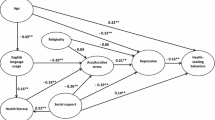Abstract
Background
Culture shock is a form of psychological distress associated with migration. Social support has been identified as significantly related to the onset, course and outcome of many psychological disorders.
Aim
The aim of this study was to examine the relationship between culture shock and social support, in terms of size, diversity of the social network and quality of support received, in Greek students, in the UK.
Method
A total of 133 students completed 3 self-administered questionnaires: Culture Shock Questionnaire, Social Support Questionnaire and General Health Questionnaire (GHQ-12).
Results
Gender and the quality of support received were found to be strongly associated with culture shock. Furthermore, culture shock was significantly positively related to the level of current dysphoria and diminished with time.
Conclusion
Social support is an important factor associated with the degree of culture shock and should be taken into consideration in order to protect against or help to overcome this kind of psychological distress experienced by migrants.
Similar content being viewed by others
References
Bhugra D, Jones P (2001) Migration and mental illness. Adv Psychiatr Treatment 7:216–223
Oberg K (1960) Cultural shock: adjustment to new cultural environments. Practical Anthropol 7:177–182
Taft R (1977) Coping with unfamiliar cultures. In: Warren N (ed) Studies in cross-cultural psychology, vol 1. Academic Press, London
Mumford DB (1998) The measurement of culture shock. Soc Psychiatry Psychiatr Epidemiol 33:149–154
Mumford DB (2000) Culture shock among young British volunteers working abroad: predictors, risk factors and outcome. Transcult Psychiatry 37:73–87
Ryan ME, Twibell RS (2000) Concerns, values, stress, coping, health and educational outcomes of college students who studied abroad. Intern J Intercult Rel 24:409–435
Brugha T (1988) Social support. Curr Opin Psychiatry 1:206–211
Cohen S, Doyle WJ, Skoner DP, Rabin BS, Gwaltney JM (1997) Social ties and susceptibility to the common cold. J Am Med Assoc 277:1940–1944
Brugha TS (1995) Social support and psychiatric disorder. Cambridge University Press, Cambridge
Harris M, Bergman HC, Bachrach CC (1986) Individualised network planning for chronic psychiatric patients. Psychiatr Q 58:51–56
Brown GW, Harris T (1978) The social origins of depression. Free Press, New York
Miller PM, Lloyd C (1991) Social support and its interactions with personality and childhood background as predictors of psychiatric symptoms in Scottish and American medical students. Soc Psychiatry Psychiatr Epidemiol 26:171–177
Cohen S (1991) Social support and physical health: symptoms, health behaviours and infectious diseases. In: Greene AL, Cummings EM, Karraker KH (eds) Life-span developmental psychology: perspectives on stress and coping. Erlbaum, Hillsdale
Cohen S, Mermelstein R, Kamarck T, Hoberman H (1985) Measuring the functional components of social support. In: Sarason IG, Sarason BR (eds) Social support: theory, research, and application. Martinus Nijhoff, Holland
Cohen S, Hoberman HM (1983) Positive events and social support as buffers of life change stress. J Appl Soc Psychol 13:99–125
Goldberg DP, Williams P (1988) A user’s guide to the GHQ. NFER-Nelson, Windsor
Cohen S, Underwood LG, Gottlieb BH (2000) Social support measurement and intervention. Oxford University Press, Oxford
Hallstrom T (1986) Social origins of major depression: the role of provoking agents and vulnerability factors. Acta Psychiatr Scand 73:383–389
Mavreas VG, Bebbington PE (1988) Greeks, British Greek Cypriots and Londoners: a comparison of morbidity. Psychol Med 18:433–442
Charalabaki E, Bauwens F, Stefos G, Madianos MG (1995) Immigration and psychopathology: a clinical study. Eur Psychiatry 10:237–244
Madianos M (1984) Acculturation and mental health of Greek immigrants. In: Hudolin V (ed) Social psychiatry. New York, Plenum Press
Monroe SM, Steiner SC (1986) Social support and psychopathology: interrelations with pre-existing disorder, stress and personality. J Abnorm Psychol 95:29–39
Alloway R, Bebbington P (1987) The buffer theory of social support: a review of the literature. Psychol Med 17:91–108
Liu WT (1986) Culture and social support. Research on Aging 3:57–83
Author information
Authors and Affiliations
Corresponding author
Rights and permissions
About this article
Cite this article
Pantelidou, S., Craig, T. Culture shock and social support. Soc Psychiat Epidemiol 41, 777–781 (2006). https://doi.org/10.1007/s00127-006-0096-5
Published:
Issue Date:
DOI: https://doi.org/10.1007/s00127-006-0096-5




